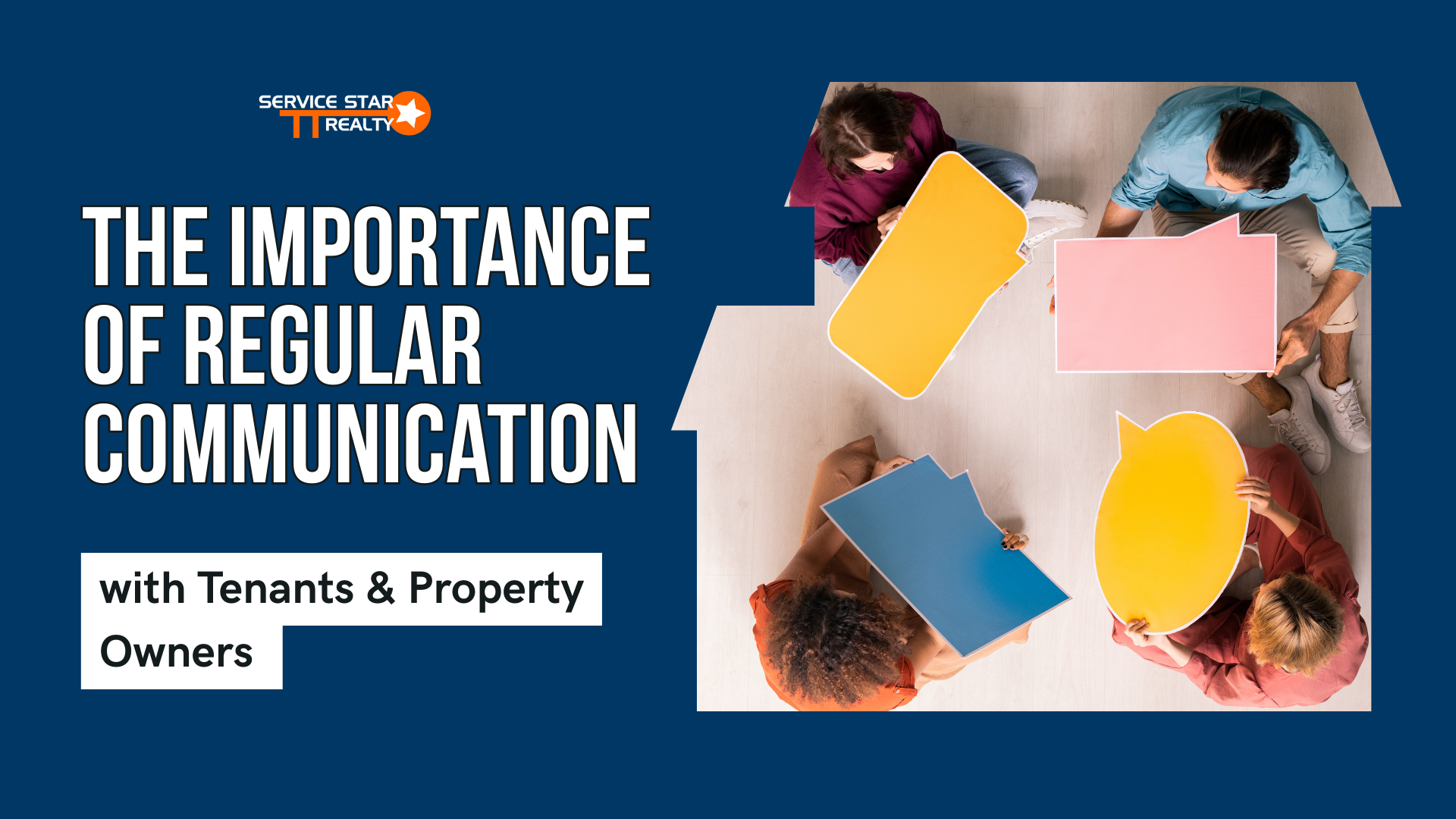Key Takeaways
To ensure continued success of your rental property, it’s important to stay up to date on how your tenants are doing.
Without consistent communication, things like maintenance, pests, and property damage can go unnoticed or become worse over time.
Partnering with a property management team can streamline rental operations, including tenant communication, rent collection, and more.
Owning rental property is more than acquiring an asset and collecting rent. Day-to-day success hinges on how clearly, consistently, and respectfully you communicate with the people tied to that asset: the tenants who live there and the owners who fund it. Regular communication prevents small issues from becoming crises, reduces vacancy and conflict, and builds the kind of trust that keeps your investment performing over the long term.
Read this guide by Service Star Realty to learn more.
Stronger Tenant Relationships, Lower Turnover
Tenants who feel heard are tenants who stay. When you check in regularly, acknowledge maintenance requests promptly, and explain timelines clearly, you signal that the home and the resident matter.
A quick message to confirm a work order, a follow-up to make sure the repair solved the problem, or a seasonal reminder about HVAC filters and weatherproofing all compounds into goodwill. That goodwill shows up as on-time payments, careful stewardship of the unit, and a willingness to renew.
Just as importantly, an open line invites early reporting. A tiny drip or a flickering outlet handled this week is far cheaper than a water-damaged ceiling or an electrical hazard discovered months later.
Fewer Misunderstandings and Smoother Operations
Many disputes begin with assumptions. Regular, plain-language reminders and timely notices keep expectations aligned. When policies change, communicating not just the “what,” but also the “why” and “when” reduces pushback.
Faster Maintenance, Lower Costs
Efficient communication shrinks downtime. When tenants know exactly how to submit requests, what details to include, and how long a typical response takes, they participate in the solution instead of chasing it.
On your side, acknowledging receipt, providing a target window, and confirming completion sets a rhythm that vendors can follow and tenants can rely on. The result is fewer emergency calls, better vendor scheduling, and more predictable budgeting.
Legal Compliance Starts with Timely Notices
Communication is also a compliance tool. Landlord-tenant laws require specific notice periods for entry, inspections, rent increases, and lease changes. Sending clear, dated, written notices well ahead of deadlines protects you and respects your tenants’ rights. It also creates a paper trail. If a dispute arises, being able to produce the message, timestamp, and content demonstrates good faith and adherence to the law.
Owners Want Visibility, Not Just Numbers
If you manage property for others, or even when you are reporting back to a partner, owners want both metrics and meaning. Rent collected, delinquency rates, upcoming renewals, and maintenance spend are essential data points, but context is the real service.
Explaining that a resident family plans to relocate for work or that an aging water heater is near end-of-life helps owners plan capital expenses and vacancy timelines with open eyes. A short monthly summary that highlights wins, risks, and next steps reassures owners that the property is being stewarded, not just administered.
Technology Is a Tool, Not a Substitute
Digital portals, auto-reminders, and ticketing systems make communication smoother and more reliable. They centralize messages, save time, and preserve a record. But technology works best when paired with a human presence.
A quick phone call after a complex repair, a personal email to welcome a new resident, or a candid conversation about renewal options gives your operation warmth. Tenants and owners remember how you made them feel; software sets the stage, and your voice delivers the performance.
Tailor the Message and the Medium
People absorb information differently. Some tenants prefer concise texts, others rely on email, and a few will appreciate a phone call for important updates. Owners are the same. Early in the relationship, ask about preferences and then honor them. Matching the channel to the person increases response rates and reduces misunderstandings.
Why Professional Property Managers Elevate Communication
Regular communication can strain your bandwidth, especially if you juggle multiple units, a day job, or a growing portfolio. A professional property management company brings structure, staffing, and systems that make communication consistent and predictable. Tenants gain a clear process for requests, realistic timelines, and a dependable point of contact. Owners receive scheduled financial statements, vacancy alerts, and proactive recommendations backed by local market knowledge.

Equally important, experienced managers operate with legal precision. They understand notice requirements, fair-housing boundaries, and the cadence of compliant messaging. Templates are vetted, timeframes are tracked, and nothing slips through the cracks. On the maintenance side, established vendor networks and triage protocols speed up repairs while controlling costs.
Practical Habits That Compound
The best communication systems are simple enough to use every day. Create a predictable rhythm for tenant touchpoints, such as a brief monthly check-in or a note before seasonal weather shifts. Acknowledge every incoming message quickly, even if the full answer requires research or vendor quotes. Close the loop after repairs so the resident knows the job is done and you know the outcome was satisfactory.
For owners, schedule a recurring summary that pairs financials with narrative insights and recommended next steps. Finally, document everything that matters: notices, approvals, landlord entry permissions, repair authorizations, and renewal decisions. Good documentation is quiet insurance that costs nothing and saves everything.
Communication Is an Asset You Build
It is tempting to treat communication as a task to get through, but it functions more like a moat you build around your investment. Every clear message, timely update, and respectful conversation deepens trust and widens that moat.
Over months and years, the return shows up in fewer turnovers, faster turns when they do happen, steadier cash flow, and lower legal exposure. The property itself may attract interest, but it is the quality of your relationships that sustains performance.
Conclusion
Regular communication is the quiet driver of rental success. It keeps tenants informed and engaged, aligns expectations, preserves legal compliance, and turns maintenance into a predictable process rather than a fire drill. For owners, it converts raw numbers into actionable insight and confidence. To ensure a smooth process, it’s best to partner with a professional property management company. Reach out to Service Star Realty if you need assistance.
Service Star Realty
1525 N Granite Reef #16, Scottsdale, AZ 85257
(480) 426-9696














